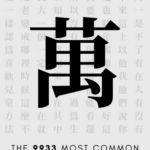Articles in the ‘Vocabulary’ category Page 3
-
Should you learn Chinese vocabulary from lists?
Students often rely on lists to learn new Chinese characters and words. This can be useful in some situations, but there are also many problems with this approach.
Read → -
Learn Chinese by playing Mahjong (麻将, májiàng)
Playing games is a wonderful way of learning Chinese, and 麻將 (májiàng) works for all beginners and advanced students alike! Apart from the numbers 1-9, you only need a handful of extra words to play. The game is extremely popular and as such, it can open up many doors, both cultural and social.
Read → -
Kickstart your learning with the Skritter Character Course
What’s the best way to learn Chinese characters as a beginner? The Skritter character course is my best attempt at answering that question.
Read → -
Hacking Chinese Podcast two-year anniversary Q&A
This is a Q&A to mark the second anniversary of the Hacking Chinese Podcast! How do you stop translating in your head? Is it worthwhile to study a Pinyin chart? And how do you learn traditional characters after learning simplified?
Read → -
How to learn Chinese characters as a beginner
Whole books have been written about how the Chinese writing system works, and understanding how Chinese characters really work is a lifelong project, but what do you do as a beginner when asked to memorise a list of characters and words? Here are eight easy-to-follow strategies!
Read → -
Do you have to learn to write Chinese characters by hand?
Chinese characters are beautiful, but they take a long time to learn, especially if you want to be able to write by hand. But do you actually need handwriting? When might you be required to write by hand? And are there any other benefits with handwriting that might make it all worthwhile?
Read → -
Why you should use more than one Chinese textbook
A textbook can only provide a sliver of the content and activities you need to learn Chinese, but rather than throwing your textbook away, try using several of them in parallel.
Read → -
Are authentic texts good for learning Chinese or is graded content better?
Authentic texts not written specifically for second language learners are rich, varied, interesting and engaging, but they can also be terribly difficult and confusing. Should you use such texts for learning Chinese, or are you better off using content tailored to language learners?
Read → -
What to read to improve your Chinese and why
Reading in Chinese has many benefits, but why you read should also inform your choice of what to read.
Read → -
Time quality: Studying the right thing at the right time
Many students think that learning a language is limited to going to class, working your way through difficult texts or having conversations with native speakers. These all contribute to your learning, but learning is not limited to things you can schedule in your calendar. If you think of it like that, you’ll miss so many learning opportunities!
Read →









